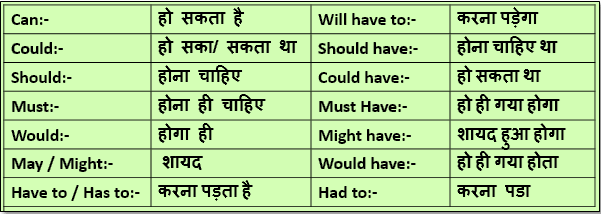Modal Auxiliary : Online English Speaking Course Level-3
Modal Auxiliary | Modal Auxiliary Grammar: English Speaking Course

If you want to learn English speaking you must practice modal auxiliary verbs in your day to day activity. A modal verb is a type of verb that is used to indicate: likelihood, ability, permission, request, capacity, suggestions, order, obligation, or advice. Modal verbs always accompany the base form of another verb having semantic content.
Can:- हो सकता है
- Sub + Can + verb + Obj.
- Sub + Can + not + verb + Obj.
- I can bathe with cold water.
- I can not bathe with cold water.
Could:- हो सका/ सकता था
- Sub + Could + verb + Obj.
- Sub + Could + not + verb + Obj.
- She could understand the Arabic language.
- She could not understand the Arabic language.
Should:- होना चाहिए
- Sub + should + verb + Obj.
- Sub + should + not + verb + Obj.
- We should speak the truth.
- We should not speak the truth
Must:- होना ही चाहिए
- Sub + Must + verb + Obj.
- Sub + Must + not + verb + Obj.
- We must rest for a long time.
- We must not rest for a long time
Would:- होगा ही
- Sub + would + verb + Obj.
- Sub + would + not + verb + Obj.
- Police would catch the thief
- Police would not catch the thief.
May / Might:- शायद
- Sub + May/ Might + verb + Obj.
- Sub + May/ Might + not + Verb + Obj.
- She might come to college on time.
- She might not come to college on time.
- I may lend your book.
- I may not lend your book
Have to / Has to:- करना पड़ता है
- Sub + have to /has to + verb + Obj.
- Sub + do/does + not + have to + verb + Obj.
- Ram has to teach.
- Ram does not have to teach.
Had to:- करना पडा
- Sub+ had to + verb + Obj.
- Sub + did + not + have to + verb + Obj.
- I had to write a letter.
- I did not have to write a letter.
Will have to:- करना पड़ेगा
- Sub + will have to + verb + Obj.
- Sub + will + not + have to + verb + Obj.
- I will have to think.
- I will not have to think.
Should have:- होना चाहिए था
- Sub + should have + verb3rd form + Obj.
- Sub + should + not + have + verb3rd form + Obj.
- We should have respected elders.
- We should not have respected elders.
Could have:- हो सकता था
- Sub + could have + verb3rd form + Obj.
- Sub + could + not + have + verb3rd form + Obj.
- I could have learned.
- I could not have learned.
Must Have:- हो ही गया होगा
- Sub + must have + verb3rd form + Obj.
- Sub + must + not + have + verb3rd form + Obj.
- He must have done my work.
- He must not have done my work.
Might have:- शायद हुआ होगा
- Sub + might have + verb3rd form + Obj.
- Sub + might + not + have + verb3rd form + Obj.
- You might have seen my elder Brother.
- You might not have seen my elder Brother.
Would have:- हो ही गया होता
- Sub + would have + verb3rd form + Obj.
- Sub + would + not + have + verb3rd form + Obj.
- You would have got money.
- You would not have got money.
A few Example of Modal Auxiliary are:
- I can type very well
- You can go now
- He can Swim very well
- You can leave the room after your work
- She could not speak fluently
- It may rain today
- Could I speak to Mr. Imaduddin, sir?
- Can I talk to the principal?
- He might come today to see you
- He may come to college today
- He might come to the station to see you
- May I have a little more tea?
- We should be careful while boarding the local train
- Would you allow me to use your phone?
- Would you come to my house tomorrow?
- Would you do me a favor?
- You must hand over the keys to the neighbor
- You have to leave the room immediately
- You have to complete your paper before time
- I had to leave now
Types of tenses Click Here
If you want tips for English Speaking Skill Click Here



English spiking
I interest these Course
I’m interested speaking in english
English grammar and spiking
English speaking